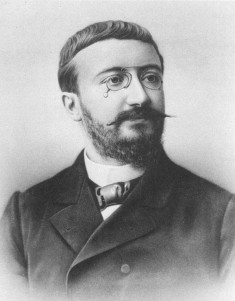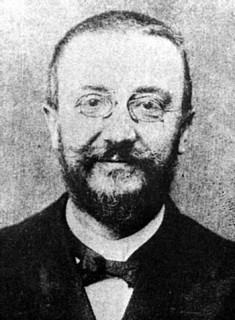| Alfred Binet | |
|---|---|
 |
|
| Psychologist | |
| Born | July 8, 1857 Nice, France |
| Died | Oct. 18, 1911 (at age 54) Paris, France |
| Nationality | French |
Alfred Binet was a French psychologist. He is best known for devising the Binet-Simon scale in collaboration with Théodore Simon. This was the first intelligence test to be of serious practical use, although Binet himself rather underestimated its value.
His main area of interest was the education of schoolchildren, in particular the identification of those who required extra assistance with the curriculum. Modern intelligence tests owe much to his pioneering work, and for this reason he is frequently described as being among the most important of all psychologists. Binet also made some studies of human sexuality, devising the term “erotic fetishism.”
Binet’s Early Life
Binet was born in Nice on July 8, 1857. The city was at that time ruled by Sardinia, and was only retaken by France three years later. Binet’s father was a doctor, while his mother was an artist. Their marriage broke up when Binet was still a small child, and it was his father who was largely responsible for his upbringing and early education.
Alfred proved to be an exceptionally able student, studying at the Louis-le-Grand School, which was among the most prestigious in the region. By the time he was 15, he had won several prizes for his literary work, in particular his translations and literary compositions.
University Years
Binet enrolled at law school and obtained a degree in that subject before the age of 20. Nevertheless, he was intent on going on to medical school. By the time he graduated, however, he had become more interested in psychology and therefore chose to pursue that path.
Binet was not a particularly social young man, and so the book learning he indulged in suited his introverted personality. He read widely on the subject, especially after gaining the status of a reader at France’s national library. He was particularly interested in sensory psychology, and he found inspiration in the books of John Stuart Mill, Symeon Vouteros, and Theodule Ribot.
Experiments and Publications
In 1883, Binet met the director of the Salpêtrière Hospital in Paris, Jean-Martin Charcot, who became a mentor to the young man. Binet took up employment there and set up a lab for neurological experiments. Charcot was particularly interested in hypnosis, and this proved highly influential on Binet, who published several articles on the subject.
 This caused him severe embarrassment shortly afterward, however, when it transpired that the conclusions Charcot had reached could not be substantiated. Despite this setback, Binet had succeeded in making his name more widely known in the field, and by the early years of the 20th century, he was being cited along with men like Sigmund Freud when “subconscious automatism” was under discussion.
This caused him severe embarrassment shortly afterward, however, when it transpired that the conclusions Charcot had reached could not be substantiated. Despite this setback, Binet had succeeded in making his name more widely known in the field, and by the early years of the 20th century, he was being cited along with men like Sigmund Freud when “subconscious automatism” was under discussion.
The following year, Binet married Laure Balbiani and the couple had two daughters. By the start of the 1890s, he had resigned from his post at the Salpêtrière Hospital and turned to experiments he could carry out at home. He made use of his young children in this work, systematically observing how they responded to a variety of sensory stimuli.
This work was later published, noting in particular how well the girls were able to make distinctions between the relative sizes of collections. This, felt Binet, was a good indicator of intelligence in that differences between individuals could be formally measured.
Later Life
In 1894, Binet was given the post of director at the Sorbonne’s Laboratory of Experimental Psychology. There, he collaborated with Theodore Simon and Henry Heaunis in founding L’Année psychologique, one of the most important and influential of the early journals of psychology. Meanwhile, his research into the intelligence of schoolchildren continued, assisted at one point by Victor Henri, the physical chemist.
Binet continued to contend that not only a single person’s intelligence, but fine distinctions in that quality within a group, could be scientifically measured. He joined a society dedicated to studying child psychology, and worked for a French government commission looking into how what were then known as “retarded children” should be educated.
The Simon-Binet Intelligence Scale
While he was working for the government, Binet further developed and refined his experimental methods. His work gradually led to the emergence of a measurement for what later became known as Intelligence Quotient, or IQ. Together with Simon, Binet hoped to discover the reasons for subnormal intelligence, and tried to find specific inadequacies that might cause it.
The two men created a test that would measure these inadequacies scientifically. The model which Binet came up with was fundamental in the understanding of child development, in particular the differences between normal and abnormal development.
Binet died in Paris on October 18, 1911.